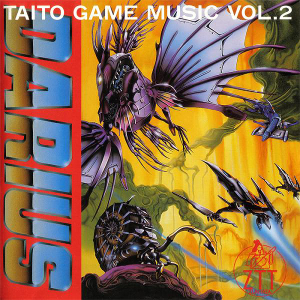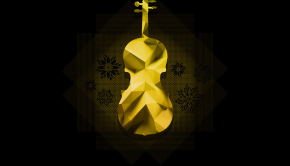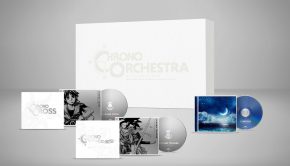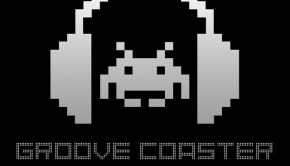Darius -Taito Game Music Vol. 2-
 |
Album Title: Darius -Taito Game Music Vol. 2- |
| Record Label: Alfa Records |
|
| Catalog No.: 28XA-166 (CD); ALC-22912 (Tape); ALR-22912 (Vinyl) |
|
| Release Date: June 25, 1987 |
|
| Purchase: Buy Used Copy |
Overview
In 1987, Taito created one of their most ambitious games to date: Darius. Much more artistically driven than their previous hit titles, Space Invaders and Puzzle Bobble, Darius featured spectacular sci-fi visuals and an even more impressive score. With Darius‘ soundtrack, Hisayoshi Ogura (aka OGR) decided to reject the fast-paced, hyper-melodic approach of other shooters of the day in favour of a more experimental, atmospheric score that blended organic and inorganic elements throughout. The score has been released in several forms over the years, the first being Darius -Taito Game Music Vol. 2-. Featuring original sound medleys and five arranged tracks, this ambitious but flawed album was released by Alfa Records on CD, tape, and vinyl.
Body
Throughout the album, stage themes are presented in medleys with their accompanying boss themes. For the first stage, for instance, listeners are introduced to “Captain Neo” with its exuberant jazz-influenced main melody and industrialised bass line. Despite the humble sound chips, the fusion still sounds great for its time. It’s one of the most memorable and appropriate first stage themes for any shooter. Its boss counterpart, “Boss Scene 1”, is a minimalistic track that resolves entirely around a repetitive pulsating bass line and some treble frills. Though not especially appealing on a stand-alone basis, it sustains repetition very well during the game and fits the scene perfectly. While these tracks are effective on their own, their presentation as a medley makes the album a little difficult-to-navigate. More sinisterly, however, the total track time of this medley is just 2:11 hence the tracks aren’t fully looped in contrast to the 1992 Pony Canyon and 2007 Zuntata Records editions of the album.
Stage and boss themes are paired up for the subsequent five medleys on the soundtrack too. The same patterns follows, with the stage themes usually appealing with their memorable hooks and atmospheric stylings, while the boss themes tend to be more hostile and jagged. Highlights include “Cosmic Air Way”, which perfectly captures that vibe most would associate with old-school game music, and “Inorganic Beat”, with its strong percussive emphasis throughout. The album also introduces the main theme for the series, “Chaos”. Whereas the opening theme “Captain Neo” was almost superficially melodious, this one takes a totally abstract approach. Expect aggressive orch hits, haunting sound effects, weird dissonant harmonies, and an ever-repeating headline phrase.
Moving to the climax, “The Sea” initially slowly and smoothly meanders to give a beautiful watery soundscape. However, the section from 0:39 is a complete contrast with its dissonant articulated chords, giving off a feeling of impending doom… For the final six minute medley, listeners are subsequently dazzled with a succession of three boss themes, the first two hostile and rhythmically focused, the final battle theme far more interesting. “Boss Scene 7” starts out with standard “Warning” motifs, but once the track actually starts, the listener is definitely taken on a joy ride. Thick bass lines, strong rhythmic motifs, and just an all-around groovy melody makes this track exceptional. This is probably my favorite boss theme from the first Darius. The soundtrack is completed by the bouncy end credits jingle. However, several of the supplementary fanfares and the sound effects collection from the subsequent prints of the soundtrack are completely absent here.
Thankfully, that’s not all that Darius -Taito Game Music Vol. 2- has to offer. The album also features five exclusive arrangements, three created by the Zuntata team, the other two created by Kimitaka Matsumae’s unit Constance Towers. The main theme “Chaos” benefits immensely from the arrangement, with the jagged synth lines of the original being powerfully articulated with modern samples and instruments. Whereas the original track looped just after a minute, this arrangement keeps listeners enthralled for four whole minutes. The adaptations of the soundtrack’s anthems “Cosmic Air Way” and “Captain Neo” are similar to what one might expect; they nicely bring out the melodies of the originals with enhanced synth and various elaborations, but don’t do anything particularly daring.
The arrangements from Constance Towers are the most ambitious here. “Inorganic Beat” is a complete transformation from its original, which almost entirely focus on chaotic percussion rhythms. Instead, Matsumae and co borrow from all sorts of styles such as industrial, classical, and jazz music to create a bizarre, colourful blend that captures the essence of the Darius series. This arrangement exceeds even some of those created ten years later for Darius the Omnibus -Generation-. As for “The Sea”, it is an extremely liberal interpretation of the original music. it creates quite rich imagery with its very abstract blend of piano, marimba, violin, and what sounds like an accordion (one of the strangest ensembles I’ve heard). Just like the original, it does shift in its latter half: but instead of going nightmarish, it elevates into an upbeat jazz number. It’s great to hear that, even back in 1987, arrangers were prepared to do some pretty daring things with admittedly some very daring original material.
Summary
Overall, Hisayoshi Ogura’s score was revolutionary for its time and still is an impressive listen all these years later. Whether its memorable main themes, experimental avant-garde stylings, or incredible synthesis, the soundtrack is a major creative feat. However, Darius -Taito Game Music Vol. 2- is not the best way to enjoy it given the original piece are arranged into medleys, cut very short, and are sometimes missing altogether. The 1992 physical edition, 2007 digital edition, and series box set present the music in a much more satisfying way. The main strength of the album are the number and quality of the arrangements. For 1987, these were some of the most experimental arrangements to make it on to a game soundtrack and certainly reflect Hisayoshi Ogura’s intentions. However, these tracks are too few to really justify the high pricetag of tracking down this long out-of-print album. Only hardcore Darius collectors should pick this one up.
Do you agree with the review and score? Let us know in the comments below!
3.5
Posted on November 7, 2015 by Don Kotowski. Last modified on January 19, 2016.














